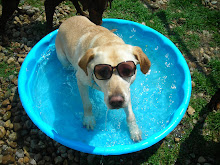 In this next installment we're going to talk more about Pet Safety and give you some suggestions on winter pet care.
In this next installment we're going to talk more about Pet Safety and give you some suggestions on winter pet care.Remember to be very careful with sick or older pets since they are more sensitive to cold weather. For any pet sensitive to the cold due to age, illness, or breed type, take him/her outdoors only to relieve themselves. Puppies don't tolerate the cold as well as adult dogs and may be difficult to house break during the winter. If necessary, train your puppy to the paper inside if he/she appears to be sensitive to the cold. Our trainer at Best Friend's can help you to retrain them to go outside when they get older and the weather warms up again.
Even brief exposure to sub-zero temperatures can lead to frostbite of the feet nose or ears. Frost bitten skin appears red, gray or whitish and may peel off. Prevent frostbite by removing ice and snow from their paws and fur right away. If you suspect frostbite, take your pet to a warm place and thaw out frostbitten areas slowly by applying warm moist towels. Change them frequently. Continue until the affected areas become flushed. Then contact a veterinarian for further care.
 Brush your dog vigorously and regularly. The air in most houses becomes dry during the colder months, which depletes moisture from the dog skin and fur. Brushing improves skin, coat and circulation. A thick coated dog typically needs grooming in cold weather. The fur can get wet and matted, making it an irritant. Clean fur lofts and holds air in a manner similar to a layering of clothes, thus helping your pet to stay warmer. Try to never shave your dog down in the winter. Leave the coat longer for warmth. When you bathe your dog, completely dry him/her before taking them out for a walk. If you find the grooming is too much of a hassle for you in your home in the winter months please feel free to call and make an appointment with our Best Friend Groomers. They would be more then happy to help keep your pet safe from the winter chill!
Brush your dog vigorously and regularly. The air in most houses becomes dry during the colder months, which depletes moisture from the dog skin and fur. Brushing improves skin, coat and circulation. A thick coated dog typically needs grooming in cold weather. The fur can get wet and matted, making it an irritant. Clean fur lofts and holds air in a manner similar to a layering of clothes, thus helping your pet to stay warmer. Try to never shave your dog down in the winter. Leave the coat longer for warmth. When you bathe your dog, completely dry him/her before taking them out for a walk. If you find the grooming is too much of a hassle for you in your home in the winter months please feel free to call and make an appointment with our Best Friend Groomers. They would be more then happy to help keep your pet safe from the winter chill!Use a fatty acid supplement during the winter, ideally starting several weeks before cold weather sets in to help the skin and coat conditions. If your dog engages in a lot of outdoor activities or is a frequent visitor to our Doggie DayCamp program, increase his/her food supply to help keep the coat thick and healthy. They also burn a lot more food in the precess of staying warm! Keep in mind as well that the dryness in our homes can make animals more susceptible to problems such as dry noses, upper respiratory infections, dandruff, itchy skin, hair texture changes, dry throats and more.
Portable heaters and fireplaces can be deadly hazards for our pets. Use screens for the fireplaces and put portable heaters out of their reach. Do not run a portable heater when you are not there to monitor them. Each year a number of house fires start this way.
To avoid injuries, hypothermia and drowning, don't let your pets venture out onto frozen ponds.
If you see an animal in distress, please call your local humane society right away. It doesn't take long for a companion animal to suffer and fall victim to severe winter weather. Remember that frostbite occurs when the fluids in the tissues freeze, frequently on the tips of the ears, paws, pads or flanks and belly. Hypothermia, which can lead to death occurs when the animals body temperature drops significantly below normal, causing the systems to shut down.
Contributing to this article:
Kyle Raun; University of Minnesota, Veterinary Medicine
University Commons; Naperville Illinois
Partners for Animal Welfare








I use a infrared portable heater in my house when I am home that is pet safe, it does not get hot to the touch. I bought mine from this website, www.oneclickoutdoorliving.com (I got free delivery, big savings)
ReplyDeleteI do agree that this or any other heater should not be left on when you are not home, but I do leave it on at night and do not worry about my dogs getting injured from the heater.
K